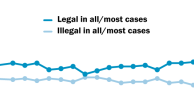
U.S. adults in their 20s and 30s plan to have fewer children than in the past
These declines in the number of children adults plan to have occurred almost entirely in the last decade.
Numbers, Facts and Trends Shaping Your World
These declines in the number of children adults plan to have occurred almost entirely in the last decade.
U.S. Muslims tend to be younger and more highly educated than other Americans. But they’re similar to Christians on many religiousness measures.
Far more Americans oppose the legislation than favor it. Nearly half (49%) oppose it, while 29% favor it. Another 21% are not sure.
The public is split over local law enforcement helping deportation efforts, and majorities disapprove of suspending asylum applications.
Nearly half of U.S. adults are connected to Catholicism. Read about going to Mass, Communion, confession and more.
In 34 states and D.C., more people say abortion generally should be legal than say it generally should be illegal.
Abortion has long been a contentious issue in the United States, and it is one that sharply divides Americans along partisan, ideological and religious lines.
About half of U.S. adults (53%) say they hear or read about Ozempic, Wegovy and similar drugs being used for weight loss extremely or very often.
The number of households headed by same-sex couples in the U.S. has risen steadily, but they represent a small share of all married couples.
Same-sex parents discuss their unique challenges and paths to parenthood, as well the support they’ve received from their families, friends and communities.
Notifications
